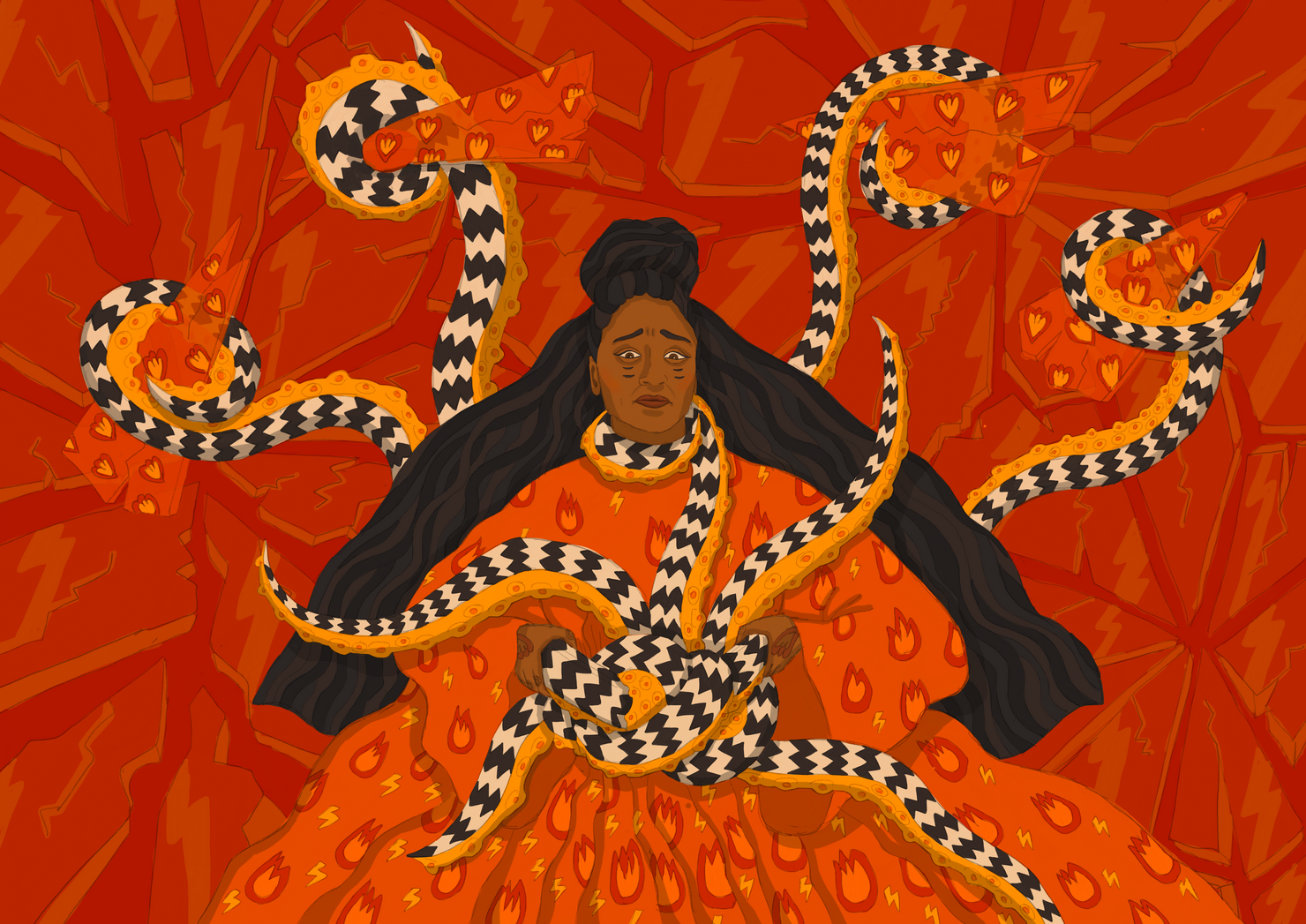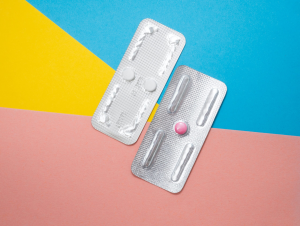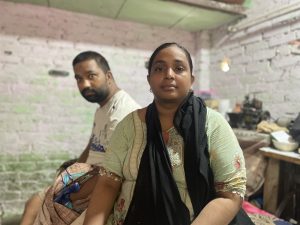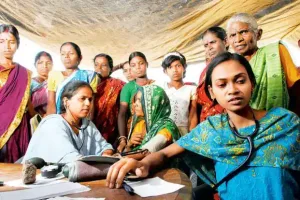A Menstrual Disorder Suffered By Billions of Women Is Still Dismissed Lightly

I always suspected there was something wrong with the way I experience my periods. There were many days that I would feel the onset of PMS symptoms at least 10 days prematurely – bloating, mood swings, fits of rage. On some days I would be extremely motivated, on others I would find it hard to get the day started. There were times when I would isolate myself to prevent myself from bursting into tears or screaming at people. I always wrote off my symptoms as PMS, never questioning my experiences.
It was on Instagram that I first heard of Premenstrual Dysphoric Disorder (PMDD), and intuitively realised that this is what I was experiencing. The disorder has been defined in the Diagnostic and Statistical Manual (DSM-IV) of the American Psychiatric Association as “a cyclical, hormone-based mood disorder with symptoms arising during the luteal phase of the menstrual cycle [day 14 of the cycle] and subsiding within a few days of menstruation”.
What I, and many of the women I spoke to, did not know was that PMDD is a serious condition that impacts 60 million worldwide and that it is reported by nearly 5.5% of women and AFAB (Assigned Female at Birth) individuals who are of reproductive age.
It is also a debilitating condition, as I detail later, which is barely recognised in India and many parts of the world: a global study by IAMPD of 591 patients diagnosed with PMDD published in BMC Psychiatry revealed that 34% attempted suicide.
However, I never went to a doctor because I could still deal with the symptoms. Things changed dramatically after my father passed away unexpectedly in April 2021. I then started experiencing a low I never felt before. These feelings were further triggered during periods and over the coming months, they worsened. On my birthday last year, I could barely function. I had bad meltdowns, could not talk to people, it was hard to even get out of bed and go to work.
At my lowest low, I forced myself to speak to a doctor who finally diagnosed me with PMDD.
Dismissed as PMS
Poor awareness of the disorder and paucity of treatment options meant that on average, patients waited 12 years and visited at least 6.15 providers before receiving a diagnosis of PMDD, reported BMC Psychiatry.
“PMDD is a severe negative reaction in the brain to the natural rise and fall of estrogen and progesterone. It is a suspected cellular disorder in the brain. Symptoms can worsen over time and or around reproductive events such as menarche (the first menstrual cycle), pregnancy, birth, miscarriage, and perimenopause,” states the International Association for Pre-Menstrual Disorders (IAMPD), a global research collective comprising those dealing with the syndrome states.
Delhi-based gynecologist Amodita Ahuja tells me that PMDD is an aggravated form of PMS with some sharp differences. “PMS is something most women experience in their daily life, with a variety of symptoms ranging from 55 to 125 symptoms. These include feelings of bloating, fatigue, fluctuating moods, headaches, and cramps that generally last 2-3 days and then subside with the period. PMDD symptoms, on the other hand, are generally experienced 14 days before the start of the period. They are also more pronounced and take a physical, mental, and emotional toll on women leaving them unable to perform everyday activities. This may induce feelings of depression or anxiety,” she said.
PMDD, which falls in the DSM-IV Category of “Other Depressive Disorders”, is unique because it is cyclic in nature. It can be diagnosed when a minimum of five symptoms are recorded during the premenstrual phase of the cycle or day 14 of the cycle. The symptoms generally worsen as menstruation closes in and they stop at the onset of the cycle or a few days after the cycle ends.
“PMDD is an emotional distress disorder, it is almost like a temporary kind of depression that sets in during a certain phase of the menstrual cycle and then lifts when the cycle is over. It’s different from other depression symptoms in a sense because it can cause symptoms such as restlessness, anxiety, catatonia, and irritability amongst other symptoms” says Nithya Rao, a counseling psychologist and the co-founder of Heart it Out, a counseling service based in Bangalore that also provides online consultations and therapy.
‘Finally, a name for what I was suffering’
Anuhya Korrapati is a doctoral scholar at Christ University in Bengaluru and has experienced PMDD for years. Now the joint secretary at Indian Institute of Health Management Research (IHEPA) and a youth advisory board member at IAPMD, she recalls that her experiences of PMDD were often dismissed by doctors.
“I always had symptoms of PMS growing up, which I knew was unique since I was a serious athlete who competed in several competitions including state- and national level competitions,” she said. “As I grew older, my experiences and symptoms of PMDD began to worsen though I didn’t know about the disorder then. When I approached doctors in India, my symptoms were always dismissed as PMS. I developed my own coping mechanisms. I started drinking more and this only worsened my condition. I eventually moved to the UK for my second Masters. Then as a result of a sudden Vitamin D deficiency, my periods became more irregular which further aggravated the symptoms. It was then that I went to a doctor, who unofficially diagnosed me with PMDD.”
The diagnosis that came after three months of tracking of symptoms, she said, came as a huge relief – finally she could put a name to her condition.
Among the earliest social media mentions of PMDD came from Shehla Rashid, a PhD student at JNU, who shared her story on Twitter.
“I always experience PMS. I find myself feeling upset or crying for no reason. The next day, I would get my period and I realized that it was happening because of that,” she told me. “One night though, I was having a really bad episode. I was in so much pain, that all I could think about was killing myself and ending it all. I started reading into methods to make it as quick and painless for me. I fell asleep that night and when I woke up the next day, I started my period.”
Rashid said she was disturbed enough by the experience to Google “periods and suicide” and stumbled upon PMDD. Her symptoms included acute psychological and physical symptoms. “My digestive system was completely thrown off, I would experience gastric issues and I would throw up. It was horrible. The diagnosis in itself was a relief but it brought with it another set of issues – at the time no one in India had spoken out publicly about PMDD, and there were few doctors in the country who knew about it,” said Rashid. Her symptoms were later confirmed by a doctor.
It was after considerable search that she found support on social media and IMPD too reached out to her with help and resources. “As a student activist, I experience a lot of trolling on a daily basis. However, this was one space where I got support from all sections, both left-wing and right-wing,” she said.
Diagnosing PMDD
Korrapati tells me there is a lack of awareness in the medical fraternity about PMDD; it was only recently added to the International Classification of Diseases (ICD) created by the World Health Organization to code, classify and diagnose diseases. “Globally doctors are expected to undergo continuous examinations even after they get a degree so that they learn about new diseases or new lines of treatments. In India, that does not happen,” she said.
Rashid had to research on her own about the treatment for PMDD. ”I was fortunate to receive a lot of resources from the online space which included IAMPD,” she said.
According to Ahuja, for a PMDD diagnosis, it is important to figure out if the symptoms of depression or anxiety existed before or are linked to the menstrual cycle. But there are also resources available to track the symptoms and these can be shared with qualified professionals given the limited understanding of the problem. Services include a diagnostic app or a sheet that can be downloaded and printed and has been curated by IAMPD. The materials are also available on the website of BeyondBlood, an NGO that works on research and advocacy around menstrual health and mental health which was founded by Anuhya in 2017. Beyondblood is the global partner of PMDD.
Treatment lines
PMDD needs a comprehensive treatment plan that should ideally include a gynecologist, psychiatrist/psychologist, a lifestyle coach, and a dietitian, according to Ahuja. Since PMDD is linked to hormonal fluctuations, oral contraceptives may be prescribed. This stops ovulation and there will be no changes in the hormonal cycle. Counseling too is recommended to address the psychological symptoms of the condition.
Diet is also reported to have a significant impact on the condition: for example, a reduction in salt intake has been shown to reduce bloating; inclusion of Vitamin B6, magnesium, and essential fatty acids too is recommended. “It is important to recognize that the process of healing is not easy, that is why I would recommend a life coach who could help the patient incorporate all these changes in their life,” said Ahuja.
Birth control pills are not always effective in PMDD. “Before my PMDD was diagnosed, I was given birth-control pills which did not work for me at all. In fact, they only worsened existing symptoms. I was forced to stop after a month. When I was diagnosed I later realized that I had progesterone intolerance, which again is something that many people experiencing PMDD have experienced,” said Korrapati.
My experience was similar – I was first treated with birth control pills and serotonin. But I reacted very badly to the pill and stayed with just serotonin though it did not entirely eliminate the symptoms of PMDD.
Korrapati told me she underwent a range of therapies and finally decided to go in for chemically-induced menopause. “I took cognitive behavioral therapy which worked really well for me. I also underwent EMDR treatment [eye movement desensitisation and reprocessing, a therapy commonly used to treat patients who have experienced trauma] which was really helpful. It is important to recognise that many people suffering from PMDD have experienced trauma. This really made a difference for me in the long run. However, I still experienced a lot of difficulties and issues with PMDD. I eventually decided to undergo chemical menopause,” she said.
Chemical menopause is an alternative for PMDD patients who do not respond to available treatments. IAMPD defines it as a “temporary (and reversible) menopausal state created with the use of Gonadotropin-Releasing Hormone Analogues (GnRHa) – a type of drug which acts on the pituitary gland in the brain to suppress ovulation and production of ovarian hormones”. By fully suppressing the menstrual cycle, the functions which lead to PMDD symptoms are eliminated.
“The key is to treat myself with kindness. I track my symptoms and I am aware of what happens during this period, and I make sure to substitute negative coping mechanisms with positive ones.” Korrapati told me.“I am no longer on chemical menopause and SSRI treatment works great for me now.”
Problematic narrative
“It is important to recognize that our current health system is completely androcentric (malecentric),” said Korrapati. “Medical research for women is centered around the ideas of beauty and pregnancy, reflective of the larger sociocultural context. A large amount of research is focused on menstruation. The second feminist wave did bring a change in the perspective and it did lead to new research and documentation but even that, in a sense, was not concise. It was not patient-centric and contributed to a very problematic narrative that downplays the experiences of women during their periods.”
Doctors point out that menstrual health continues to be a deeply stigmatized topic, discouraging women from being open. “Many were encouraged to make lifestyle changes, instead of the disease being treated as a serious condition,” said Ahuja.
Rashid remembered having her problems mansplained to her. “People told me that I should not be having these thoughts and gave me advice without actually understanding the issue at hand. We continue to make fun of PMS,” she said.
Looking forward
Beyond Blood has launched several projects to challenge everyday perceptions around menstruation. Their flagship program was on PMDD Patient Advocacy, Education and Research, and we are global partners of PMDD. One of their projects, the Biological Reality Project captured diverse menstrual experiences such as PMDD, Polycystic Ovarian Syndrome (PCOS), queer and trans menstruation, and menstruation among persons with disabilities through auto-photography storytelling.
“The landscape of medical research is slowly changing every day,” said Korrapati. “Now, there are many more studies coming up that are qualitative and patient-centric. Many are conducted by PMDD patients themselves.”
Working on this piece was a unique experience for me as a young journalist because I realized the commonalities of these experiences. I found solidarity and comfort in my conversations with Anuhya Korrapati and Shehla Rashid, who come from very different backgrounds. These solidarities have helped me find hope and given me the courage to be more outspoken about my own journey with the disorder.
We believe everyone deserves equal access to accurate news. Support from our readers enables us to keep our journalism open and free for everyone, all over the world.




